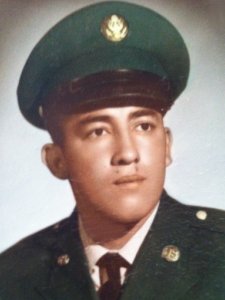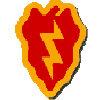| |
|
|
|
Roger Espinoza Rodriguez
Private
B CO, 2ND BN, 35TH INFANTRY, 25TH INF DIV, USARV Army of the United States Heber, California January 04, 1944 to May 29, 1966 ROGER ESPINOZA RODRIGUEZ is on the Wall at Panel 7E, Line 122 See the full profile or name rubbing for Roger Rodriguez |
  |

|



| |
|
This memorial is dedicated to a dear young soldier who loved life and died defending it. He gave all he had to his country and I want to have him remembered. He loved the 25th, "The Tropic Lighting" and he loved his buddies. I got to be pinned by this courageous young man when I was a young high school student. We wrote and laughed and loved life. He loved his Army buddies and gave more than anyone could ever give for them, his life. Rest in peace, my young soldier.
From the last girl he gave his infantry pin to, |
A Note from The Virtual WallBy early May 1966 it became apparent that North Vietnamese Army forces in western Pleiku Province had recovered the capability to threaten a strike against Pleiku City. Elements of the 25th Infantry Division were relocated in order to strengthen the US presence in the area and to provide the forces necessary to build a defensive cordon west of Pleiku City. By the third week of May intelligence indicated that the 66th NVA Regiment was moving east. Analysis of the terrain and force locations convinced the US commander that the NVA would move through the center of three east-west river valleys, since the northern and southern routes were guarded by the US Special Forces camps at Plei Djering and Duc Co. He accordingly directed the 2nd Bn, 35th Infantry to establish a forward command post in the area of concern and conduct rifle company sweeps across the NVA's likely route of march.The Battalion CP was established at LZ 11 Alpha, 12 kilometers northwest of Duc Co. Bravo Company 2/35 was directed to prepare for an air assault into LZ 10 Alpha, about 14 kilometers north-northwest of Duc Co with instructions to conduct a sweep back to LZ 11 Alpha, 10 kilometers to the west. The assault was planned for 28 May. LZ 10 Alpha was an oval swampy area, perhaps 170 meters long by 100 meters wide, surrounded by treelines and higher terrain. On the morning of 28 May, a monsoon downpour delayed the assault. By accident, artillery preparation fires were laid against another landing area some 3 kilometers distant - an error that worked to the American's advantage. The NVA regimental command post and base area was only a kilometer north of LZ 10 Alpha, and the NVA commander had recognized the potential for an air assault into the clearing. He had emplaced five 12.5mm heavy machine guns around the oval clearing, together with sufficient troops to provide an initial defense against an air assault. However, two factors worked against him: the off-target artillery prep fires led him to divert troops to that area, and the heavy rains had flooded both LZ 10 Alpha and the heavy machine gun pits, causing the NVA defenders to withdraw to higher ground. The appearance of the Americans at LZ 10-A in the midst of a downpour was a complete, and unpleasant, surprise to the NVA. While the initial landings were not entirely unopposed, the opposition was far less than could have been arranged. Bravo Company 2/35 was able to bring in about half its men before enemy fire became heavy enough to discourage further landings - and the 60-odd US soldiers on the ground, together with air and artillery support, were enough to capture the five unmanned 12.5mm guns and thoroughly disrupt the NVA defenders. By nightfall, the remainder of Bravo 2/35, all of Alpha 1/35, and six mortars were in place at LZ 10-A. The NVA had reorganized and pulled together enough troops for a battalion-sized attack against the US perimeter, which began at about 1 am on 29 May. The attack came from the north and was opposed by organic weapons and artillery firing from LZ 11-A (which itself was under attack) and Duc Co. The fighting continued until about 4 am, when the NVA withdrew to the north. At daybreak staggered platoon sweeps out to 100 meters were ordered. Just as Alpha 1/35's 3rd Plt reached the 100 meter point, the NVA again attacked - and managed to get troops between 3rd Plt and the defensive perimeter. The 3rd Plt was able to fight its way through the NVA, but at a cost of 3 killed and 13 wounded. The NVA attacks continued throughout 29 May, and again were staved off with organic weapons, artillery, and air support. In midafternoon, Bravo 1/35, Charlie 1/35, and the Recon Plt 1/35 arrived under fire, bringing with them badly needed ammunition. The obvious willingness of the Americans to reinforce the LZ apparently was enough to convince the NVA commander that he could not overrun the LZ and he began pulling his forces back to the north, leaving only a blocking force to slow any US advance. The last US soldier killed at LZ 10-A was SP4 Donald C. Green, Bravo 1/35, who was shot during a perimeter sweep on 31 May. Eighteen other US soldiers died in the fighting on 28 and 29 May - but over 600 North Vietnamese bodies were found arond the LZ perimeter. The 66th NVA Regiment had lost nearly half its strength killed in action, and there must have been a great many more wounded. The final US death associated with LZ 10-A occurred almost 14 years after the fighting ended, when Sergeant William E. Humphrey, Bravo 2/35, died from the after-effects of wounds received on 28 May 1966.
Photo courtesy of the 35th Infantry Assn |
| Contact Us | © Copyright 1997-2019 www.VirtualWall.org, Ltd ®(TM) | Last update 08/15/2019. |
